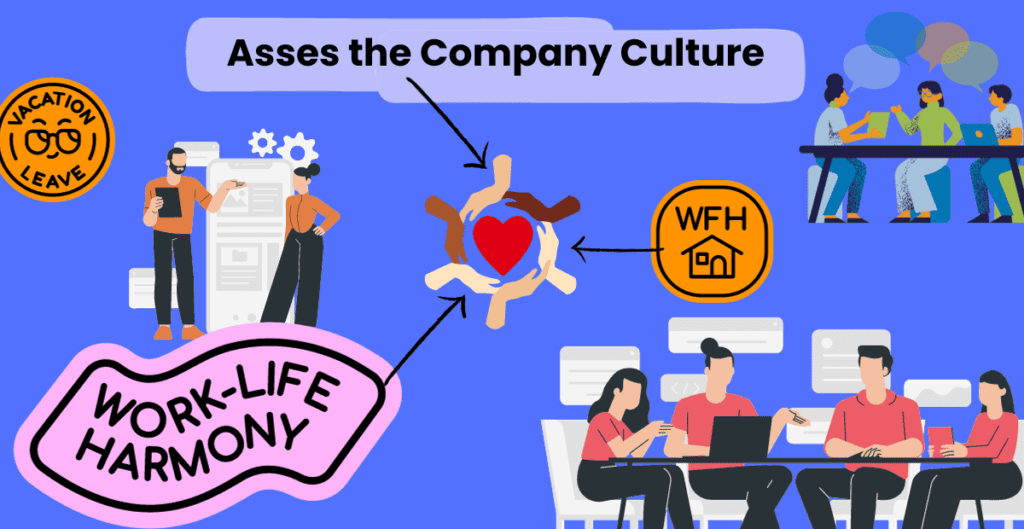How To Assess Company Culture—Before You Accept A Job Offer

Table of Contents
Key Takeaway
- Research the company through its website, social media, Glassdoor, and public statements.
- Ask specific questions during interviews about culture, teamwork, growth, and values.
- Observe the office environment, employee interactions, and leadership behavior.
- Consider company culture alongside other job aspects in decision-making.
- Evaluate personal priorities and alignment with company culture.
- Trust instincts when making the final decision.
1. Understanding the Importance of Company Culture:
It’s vital to assess company culture because it can significantly influence your work experience, job satisfaction, and career progression. Choosing a job is not just about the role or salary; it’s much more.
A positive culture can foster creativity, productivity, and camaraderie, while a negative one can lead to stress and dissatisfaction. Therefore, understanding a company’s culture before accepting a job offer is crucial to ensuring a compatible and rewarding work environment. We explain more in the article.
2. Defining Company Culture
Company culture is the collective ethos that defines an organization. It encompasses a variety of elements, including:
- Values are the guiding principles that drive a company’s actions and decision-making processes. Values can range from customer-centricity and innovation to integrity and transparency.
- Norms are the unwritten rules that dictate how employees interact with each other, their superiors, and customers. Norms can significantly impact team dynamics and collaboration.
- Belief Systems: This refers to the shared beliefs within the company about how things work or should work. They influence how people perceive their roles and responsibilities and approach their work.
- Work Environment: This includes the physical aspects of the workplace, such as office layout and amenities, as well as the organizational climate, including leadership style, communication patterns, and reward systems.
These elements create a unique work culture that defines the employee experience and shapes the company’s identity.
3. Researching the Company Culture
Tips on Researching Workplace Culture Before You Accept. There are several ways to learn and research an employer’s culture, namely;
Website Review:
The company’s website often reflects its culture and values. Check out the ‘About Us’ and ‘Mission & Values’ sections. These pages frequently contain information about the company’s ethos, guiding principles, and broader objectives.
Social Media Analysis:
The company’s social media platforms can give you a feel for its culture. Observe how the company presents itself and interacts with its audience. These platforms’ tone, content, and visuals often provide insight into the organization’s personality.
Glassdoor Reviews:
Glassdoor is an excellent resource to get an inside scoop on the internal culture via current or former employees. These reviews can depict the employer’s environment, leadership style, and employee satisfaction. Remember, while negative reviews can be informative, they must be taken with a grain of salt, as disgruntled employees may present a biased view.
Public Statements:
Reviewing the company’s public statements on corporate social responsibility (CSR) and cultural initiatives can offer insights into its commitment to ethical practices, community engagement, and employee welfare.
LinkedIn Scanning:
Use LinkedIn to research the company. Go beyond the company page and explore profiles of current and former employees. Pay attention to the skills they highlight, their language, and the company-related content they share. These can offer valuable hints about the institution’s culture. Also, LinkedIn often showcases articles and posts from company leaders, providing insight into the institution’s values and priorities.
Remember, understanding the culture goes beyond just knowing the company values; it’s about seeing how they are implemented.
Use a combination of the above methods for a well-rounded view. With thorough research, you can find a company where you’ll feel valued, be a good culture fit, and be motivated to perform your best.
4. Asking the Right Questions
Ask the recruiter or hiring manager specific questions. You will learn a lot from the answers, giving you a window into the organizational culture.
- Can you describe the establishment culture in three words?
- What’s the best thing about working for this company that I won’t be able to see from a tour?
- How does the company support its employees’ professional growth and career development?
- How does the company acknowledge and reward employee success?
- Can you give an example of how the company lives up to its core values?
- What’s the company’s approach to teamwork and collaboration?
- How does the company handle feedback and suggestions from its employees?
- Can you describe a situation that demonstrates the company culture?
- What types of community service or philanthropic efforts does the company participate in?
- How does the company promote work-life balance among its employees?
These questions are just a starting point to help you better understand a company’s culture. Feel free to ask follow-up questions to the hiring manager and go into more detail as needed.
Listening to the answers, observing how the person responds, and their body language is essential. This can give you valuable insights into the culture beyond just what is being said,
Remember, asking the right questions can help determine if a corporate culture aligns with your values, work style, and professional goals.
5. Observing and Interpreting Signs
In addition to asking insightful questions, it’s equally important to be observant throughout your interview or company visit. Subtle cues can give you great insights.
Environment and Atmosphere: Pay attention to the office environment. Is it clean and well-organized? Is it quiet or buzzing with energy? The physical surroundings can provide hints about how the company operates.
Employee Interactions: Observe how employees interact with each other. Are they friendly and collaborative, or do they mostly keep to themselves? Interactions between staff can reveal much about the company’s communication style and teamwork.
Reception: Notice how you are received when you enter the company. If employees are welcoming and helpful, it might indicate a supportive culture.
Leadership Behavior: Observe how the leaders behave. Do they micromanage or empower their teams? Their management style can reflect the overall establishment culture.
The Interview Process: Reflect on the interview process itself. Was it structured and professional, or did it feel haphazard? This could give you insights into the company’s organizational skills and emphasis on efficiency.
Remember, these signs are just indicators, not definitive proof of a firm’s culture. However, they can help you form a more rounded picture of what it might be like to work there. Always trust your gut feelings and instincts when interpreting these signs.
6. Making the Decision
Considering all these factors as a Job seeker, it’s time to weigh the company’s culture against the other aspects of the job offer. Remember, a job is more than just a paycheck – it’s where you’ll spend a significant portion of your time. It’s crucial to consider if the work environment, the team, and the leadership are a good fit for you.
Weighing the Offer: When considering an offer, you have to measure the importance of the organization’s culture against other aspects like salary, benefits, job responsibilities, and growth opportunities. Ask yourself, “Am I willing to compromise on the culture for a higher salary?” or “Is a positive work environment more important to me than job responsibilities that might not be as exciting?” These are personal decisions, and there’s no one-size-fits-all answer.
Making the Final Decision: After your research and soul-searching, the final step is making the decision. Remember to trust your gut instinct and consider your long-term career goals. A job where you feel valued and comfortable can significantly enhance your work performance and overall job satisfaction. It might not be the easiest decision, but it’s vital to your professional growth and personal happiness.
7. Conclusion
The importance of finding a job where your values and ambitions align with the company culture cannot be overstated. A harmonious fit often translates into increased job satisfaction, higher performance, and long-term career growth.
Remember, you’re not just looking for a workplace but a space to grow, contribute, and feel valued. Therefore, considering the culture of a potential workplace is not an optional extra but an essential element in your job search.
It’s about finding a place where you can be your best professional self and feel at home, even at work.
8. Frequently Asked Question
Q: What is the significance of assessing a company’s culture before accepting a job?
A: Assessing a company’s culture before accepting a job is essential as it directly impacts your work experience and overall job satisfaction.
Q: What specific questions can I ask to understand a company’s culture?
A: You can ask about the company’s mission statement, the ways it emphasizes its culture and the shared values it upholds as an entire company.
Q: Are there any online resources or platforms that can help me assess a company’s culture?
A: Yes, sites like Glassdoor provide insights and reviews from current and former employees to help you understand the company’s work culture.
Q: Can the human resources department provide information about the company’s culture?
A: Yes, the human resources department can offer information about the company’s values, work environment, and policies that reflect the organization’s culture.
Q: How can you learn about a company’s work culture during the interview?
A: You can learn about the company’s work culture by asking specific questions about the team dynamics, the right cultural fit, and the overall work environment.
Q: How does assessing a company’s culture align with finding a positive work environment?
A: Assessing a company’s culture allows you to ensure that the company offers a positive work environment that aligns with your values and contributes to your professional growth.
Q: Why must a company’s culture be assessed before accepting the offer?
A: It is essential to enter a work environment that aligns with your values and professional aspirations.
